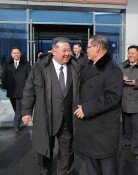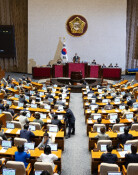Govt in Dilemma Over Civilian Visits to N.K.
Govt in Dilemma Over Civilian Visits to N.K.
Posted July. 23, 2008 09:31,
Pyongyang has recently been inviting many South Korean civic organizations and local governments to North Korea. The invites are posing a problem for the Lee Myung-bak administration.
The South Korean government has insisted that it would allow civilian exchanges, despite the souring relations between the two Koreas. Public opinion turned hostile after the North Korean army shot to death a South Korean tourist in the Mount Geumgang. The problem is it is difficult for the administration to ban civilian visits based on the publics anger.
The administration is not the only party faced with the predicament. Some organizations also feel awkward about the invitations due to public outrage over the shooting incident. Some argue, however, that the civilian exchanges might contribute to normalizing the sour South-North relations.
▽ Organizations on waiting list
Various organizations are being courted by the secluded regime in the North including vocational, local and humanitarian entities. As of Tuesday, six organizations had been offered invitations.
One hundred members of the Korean Teachers and Educational Workers Union applied for permits to visit North Korea during August. In addition, 120 South Gyeongsang Province officials including Governor Kim Tae-ho are reportedly planning to visit the regime.
Humanitarian organizations such as Good Neighbors International, Nanum International and the Korean Sharing Movement will reportedly send 40-150 delegates to the North in August (for the former two) and September. In addition, North Korean officials invited around 120 members of Peace Three Thousand, and the representatives of the two will meet in Gaesong on Saturday to discuss the invitation.
These organizations will stay two to four days in North Korea and will attend joint meetings with the North Korean Teachers Union, visit North Korean industrial facilities, tour Mount Baekdu, and attend an Arirang performance a play propagandizing the regime.
▽ Governments position
The government fears that North Korea might anger conservative South Koreans with the suggestion that, despite the South Korean governments scheme to keep the Korean Peninsula apart, the people of the two Koreas want to unify and follow the agreements made between the two countries. The possibility has been raised that Pyongyang may take political advantage of the visits by South Korean organizations at a time when the inter-Korean relationship is at a critical juncture.
It is not easy, however, for the Lee Myung-bak administration to ban their visits based on public mood. The refusal might trigger heavy resistance from the regime and the South Korean socialists who worship the regime, and an internal ideological hegemony in South Korea. Thus, the government hopes South Koreans act prudently.
When asked whether the ministry would grant the permit applications, Kim Ho-nyeon, speaking for the Unification Ministry, said Tuesday, The murder of an innocent South Korean tourist has shocked and angered all South Koreans. Not only South Koreans, but the global community is closely following the case.
Thus, the authorities will screen each applicant as well the organizations themselves to see whether they, individually or as an entity, have ever participated in any pro-North Korea activities.
But the civilian organizations allege that their visits to the North might serve as an opportunity to deliver the unfiltered sentiment of South Koreans and induce a sincere apology from North Korea.
kyle@donga.com







